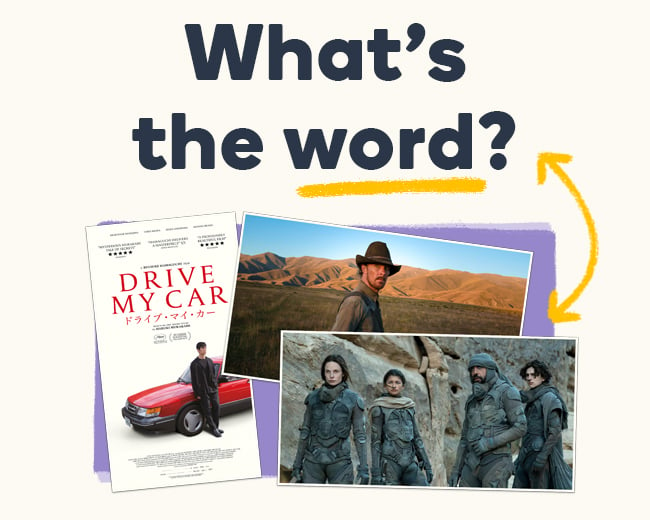Whooo. What a month of news it’s been!
We saw some awesome breakthroughs with inclusivity. The Winter Paralympics kicked off in Beijing, which has seen a record of 138 female para-athletes competing this year. Troy Kotsur became the first deaf person to win a solo award at the 22nd Annual Screen Actors Guild Awards for his performance in the emotional drama, CODA.
In other entertainment news, Anna Delvey has been the name on everyone’s lips following the drop of Inventing Anna on Netflix. Robert Pattinson’s latest outing as The Batman has also left viewers shook. No spoilers here, but if Christian Bale left some very big shoes to fill, the word on the street is that R-Patz will need to invest in some open-toes.
But in particular, these language and culture-related stories caught our eye.
The Oscars is late to the inclusivity party

Let’s face it, the Academy Awards have always been very American-centric. It’s neither good or bad, it’s just where the awards started in the first place. But even though the film industry has gone far and beyond the borders of Hollywood over the years, the Oscars haven’t always followed.
Nowadays, loads of the most famous celebrities on the silver screen have international roots, and you’ll catch a fair few of them speaking multiple languages too. And with the very first Oscars ceremony being held over 90 years ago, you’d have expected a tad more diversity to have found its way in before now. But it looks like the tide might finally be on the turn - better late than never!
This year’s awards will take place on March 28th, and we’re thrilled to see that a whole host of foreign films have made their way onto the list of nominees - and not just in the Best International Feature category. Among the nominees, we have Ryûsuke Hamaguchi’s three-hour Japanese drama Drive My Car up for none other than Best Picture (plus another THREE categories), animated Danish documentary Flee in the running for Best Animated Feature and Best Documentary Feature, and Norwegian romance The Worst Person In The World lining up for Best Original Screenplay.
Moving away from the spoken language side of things, we also can’t stop talking about coming-of-age tale CODA. An English-language version of the French film La Famille Bélier, CODA brings the world of sign language to the fore. The title is an acronym for ‘child of a deaf adult’, and focuses on the story of Ruby. As the only hearing member of her family, Ruby spends her days as an unofficial translator for her parents and brother. It’s a heartwarming take on the difficulties faced by mixed-ability families and deserves extra praise for featuring mostly deaf characters in the lead roles.
Tesla charges up its languages
 It’s known for being the car of the future, with extra-large touch screens, doors that open with the tap of an app, and a highly intuitive onboard computer. There’s also an extra cool feature called ‘sentry mode’, which kicks in if someone gets too close for too long. Cameras start recording, a message appears on the screen to say that the car is recording, and classical music plays from the speakers. It’s wild stuff.
It’s known for being the car of the future, with extra-large touch screens, doors that open with the tap of an app, and a highly intuitive onboard computer. There’s also an extra cool feature called ‘sentry mode’, which kicks in if someone gets too close for too long. Cameras start recording, a message appears on the screen to say that the car is recording, and classical music plays from the speakers. It’s wild stuff.
Over the past year, Tesla has also been adding more languages to its operating system, and the count now clocks in at 20 in total - with plenty more to come. We don’t know about you, but we can totally see a Tesla X Memrise link-up happening in the future. We’ll have our people call Elon’s people, watch this space!
Google could be bamboozling our brains

It probably won’t come as a shock that search engines like Google can have a huge effect on how our brains work - after all, the majority of us use them multiple times every day, if not every hour. They can make us think we understand things, when actually we just kinda know about them. So it could actually be a case of the more we google, the less we know, and this can put us all in a bit of a pickle in certain situations - like the big chair on Mastermind, for one thing.
When it comes to speaking foreign languages, a lot of people have begun to rely on Google Translate as their go-to source, but although they’re repeating the right words, they may have no idea what they’re saying or how to pronounce it properly. It also risks the real meaning of phrases literally being lost in translation. In short, the learner will probably end up with a very poor grasp of a language, and find it incredibly hard to actually have a conversation. Sounds like a lot of hassle to us - especially when there’s such a great alternative…
And that’s all for this edition of What’s the Word? Every month we round up some of the coolest things that are happening around the world and share them with you in the hope they’ll quench your language and general knowledge-seeking thirst just a little bit. Catch you next time!








